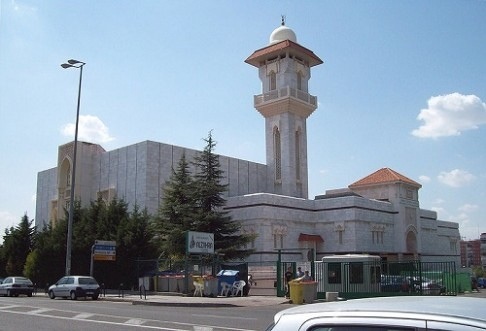The Jewish Press
Written by: Soeren Kern

Police in the northeastern Spanish region of Catalonia have intervened to prevent the forced marriage of a 13-year-old girl belonging to a Muslim immigrant family from Morocco.
The girl was one of nine reported victims of forced marriage in Catalonia during the first six months of 2012. Seven of the reported cases involved minors, but in several instances when police were alerted, they were unable to intervene in time to prevent the marriages from taking place.
Catalan police, known locally as Mossos d’Esquadra, have reported a cumulative total of more than 50 forced marriages involving minors since the regional government began compiling official data in 2009. Police, however, say this figure represents only “the tip of the iceberg“; many victims are unaware of their rights and most of the cases go unreported.
The issue of forced marriage is especially acute in Catalonia, where the Muslim population has skyrocketed in recent years. Catalonia, a region with 7.5 million inhabitants, is now home to an estimated 400,000 Muslims, up from 30,000 in the 1980s.
The Muslim population in many Catalan towns and cities now exceeds 20%; and the town of Salt, near Barcelona, where Muslim immigrants now make up 40% of the population, has been dubbed the “new Mecca of the most radical Islamism” because of efforts by Muslims to enforce Islamic Sharia law there.
According to Catalan officials, the majority of forced marriages in Catalonia involve Muslim girls from North Africa, Sub-Saharan Africa, South Asia and the Middle East. The majority of the cases involve immigrants from Morocco, followed by Pakistan, Gambia, Guinea and Senegal. Marriages are often arranged with a cousin or another family member to continue the tradition, to prevent the Europeanization of the girls, or to pay outstanding debts.
According to Catalan police, four of the cases of forced marriages during the first six months of 2012 occurred in the Catalan province of Gerona, one of the most heavily Islamized regions of Spain. Police say they were able to prevent only two of the four weddings. Three of the others occurred in the city of Barcelona, and two were within the province of Barcelona. All nine involved Muslim immigrants.
Children, on their own initiative, have even approached the police for help. The situation involving the 13-year-old girl, for example, began in January 2012, when the girl’s mother, with whom the child had been living in Gerona, died, and the father, who was residing in neighboring France, took the girl to live with him in Toulouse.
Once in France, the girl discovered that her father was planning to marry her off to a man in Morocco in early July. The girl alerted police in Toulouse, who transmitted the information to the Spanish consulate in the city. Spanish authorities then devised a scheme in which the girl persuaded her father to take her to Gerona on the pretext of completing some official paperwork. Once across the border in Spain, police arrested the father, and the girl was transferred to a foster home in Gerona.
As forced marriage is not an offense under the Spanish Criminal Code, police have been trying to use other legal avenues such as pursuing crimes involving sexual assault, unlawful detention, gender violence and kidnapping. In the instance of the 13-year-old, police determined that the girl was being subjected to physical violence, and arrested the father for child abuse. But as is often happens in Spain, the judge overseeing the case ordered the father to be released from jail.
Many reports of forced marriages of children reach police through schools: victims often confide in a trusted teacher. In one such case in 2011, police in the Barcelona suburb of L’Hospitalet arrested a 27 year old Moroccan man for forcibly marrying a minor.
The case came to public attention after a former teacher of the girl, who lives in the same apartment complex as she, alerted the police. A subsequent investigation found that the girl’s family had taken a trip to Morocco where the child was forced to marry against her will. Once back in Spain, the girl contacted the teacher, who then called the police.
Investigators found that the girl was being detained in her new husband’s apartment against her will and that she was a victim of rape. Once again, the judge hearing the case ordered the husband released from jail.
In another case, a young Pakistani girl subjected to forced marriage escaped from her husband and wandered alone on the streets of Barcelona for ten days until gathering the courage to report her situation to the police.
In some cases, the trigger for forced marriage comes when young women from Muslim immigrant families find a boyfriend in Spain and angry parents intervene. A 17-year-old girl in Gerona, for instance, was coaxed by her family to travel to her native country for a family reunion. Once there, she was forced to marry her cousin. Although she resisted because she had a boyfriend in Gerona, she relented when her family threatened to prevent her from returning to Spain if she refused to sign the marriage certificate.
Catalan police say they prevented 21 forced marriages in 2011, 13 of which involved minors; 15 forced marriages in 2010, and 13 in 2009. They also say that in 2011, they prevented the genital mutilation of 36 girls aged between two years to 12. Most of the cases (27) occurred in the province of Barcelona, eight in Gerona and one in Lérida. In 2010, Catalan police prevented the genital mutilation of 28 girls, and in 2009, 55 genital mutilations. Catalonia accounts for 80% of the girls in Spain who are at risk of genital mutilation.
Local police say that many Muslim girls in Catalonia live in fear of the so-called family reunion in disguise and that they often speak of friends who left Spain, but never returned.
Originally published by the Gatestone Institute http://www.gatestoneinstitute.org
.



